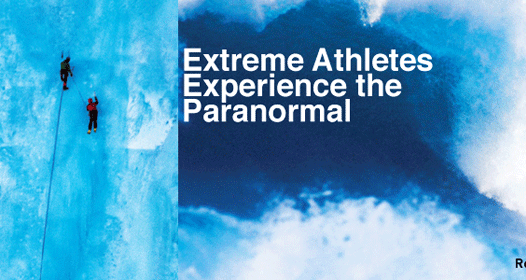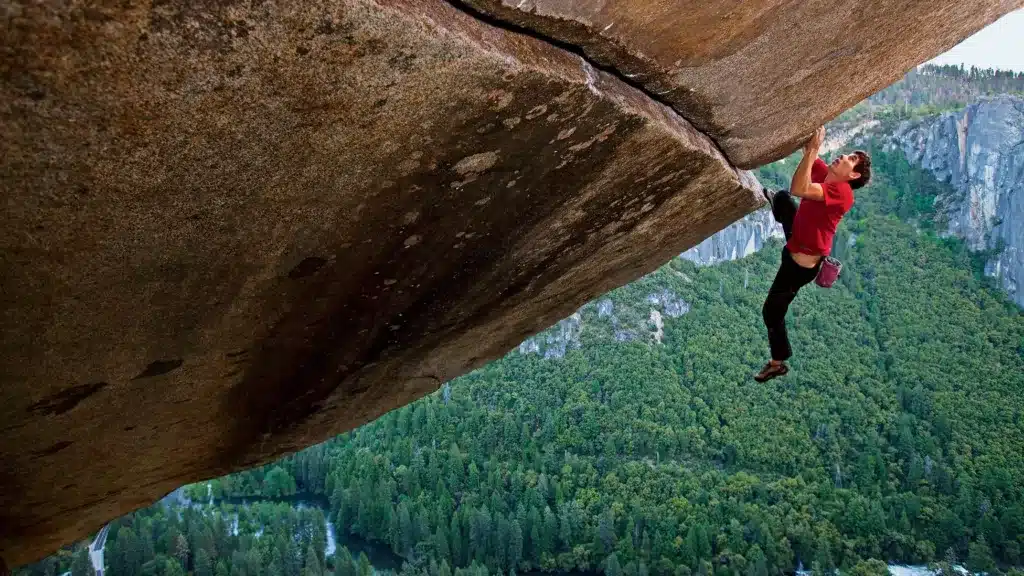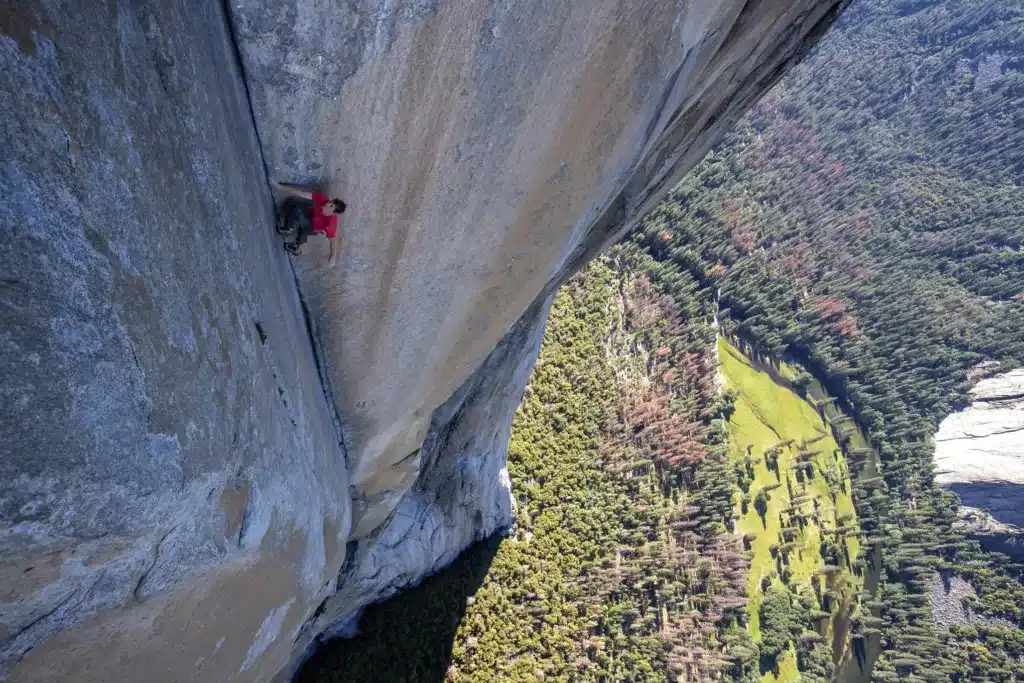Author and adventure travel leader Maria Coffey was on a rock-climbing course in England’s Lake District with several girlfriends when she had a disturbing dream.

According to her friends, during the night she suddenly sat bolt upright in bed and cried out, “Joe’s dead!” Her boyfriend, Joe Tasker, was part of an expedition attempting Mt. Everest at the time. Three weeks later, the word came: Tasker had disappeared on the mountain. The last sighting of him had occurred only hours before her dream.
Years later, Coffey interviewed dozens of extreme athletes and discovered that such “paranormal” experiences were quite common among them. From base jumpers and climbers with precognitive dreams of their own deaths to mountaineers communicating telepathically, from skiers with near death and out-of-body experiences to warnings from beyond the grave, she relates their stories in her most recent book, Explorers of the Infinite: The Secret Spiritual Lives of Extreme Athletes. The word “secret” is key; many of the men and women she interviewed had never shared their stories with anyone. In the extreme world, the topic is taboo.
Coffey herself had a near brush with death at age twenty, an experience that had a profound impact on her life and opened her mind to a larger perspective of who we are, including the paranormal aspects she explores in her book. Legions of people share such experiences, so altitude and adrenaline are clearly not prerequisites for having them. However, most of the men and women Coffey spoke with expressed a profound connection to nature and a sense of being “stripped down” to their cores when engaged in their passion, a factor they believed made such moments accessible – and, perhaps, easier to accept. She shared how the course of researching the book changed the way she conducts her life.
SC: You believe these athletes are tapping into aspects of ourselves that everyone has, but that are dormant in most of us. Why do you think that is?
MC: Because we don’t need them anymore in the modern world. Our ancestors lived in a world that was highly dangerous and highly uncertain, and they were extremely vulnerable all the time. And that’s the state that many of these extreme adventurers go into. They put themselves into a very vulnerable position in nature, and they do it deliberately. Every sense has to be on high alert in order for them to survive. They truly do live in the moment. That’s a big part of the sense of peace and the sense of satisfaction. Interestingly enough, a lot of people regard those experiences as some of the most profound and important of their life.
Many of them said, “Nobody ever asks me about this. And this is key to what I do.” I think it’s almost like I gave them permission to start talking about the spiritual aspect of what they do.
I had that experience when I was almost twenty-one and I basically drowned in Morocco. I was found blue and not breathing. It was a death experience I guess, because I was resuscitated just in time. But I still remember that as one of the most important lessons of my life, to be so close to the edge, and then come back to life. And even in the process, I was so hyper-aware and the sense of time changes so much. It’s an experience that’s etched into my psyche. Fighting to stay alive, I found powers that were dormant. Afterwards, it was if I’d been beaten up by a gang of thugs. I’d been fighting so hard for my life.
SC: Did that experience help you when you lost Joe, having been on the other side of it yourself?
MC: It did. I was very young, but it gave me knowledge of the death experience. It didn’t make losing him any easier but it did help me to understand. I realized some of what he went through.
SC: What prompted you to pursue this topic?
MC: When I started doing research for the book Where the Mountain Casts Its Shadow, I interviewed many of the world’s high-altitude mountaineers and their families. I was looking at the emotional costs of climbing, but obviously one of my questions for the mountaineers was, what is it that makes you do this?
They often give this stock answer about really pushing themselves and the adrenaline high. But what I found in all my conversations with them is that they were talking about reaching a state of being, a state of consciousness in the high mountains, both during and after times of risk, that they could find in no other place or time in their lives. They talked about reaching profound states of peace, about reaching a kind of interconnectedness with the universe, with whatever one’s personal god is. It was what impelled me to start researching for Explorers of the Infinite.
That had always been my hunch, because Joe had actually spent seven years in a Jesuit seminary, training to be a priest. He told me a lot about his time in the seminary, and a lot of it reminded me of what he went through in the mountains – cold, deprivation, celibacy, pushing himself, obviously in a different context, but a level of suffering.
The mountaineer has to be able to stand on a piece of snow on a slope and feel what that snow might do, whether it might be avalanche prone. The solo sailor must be able to read the wind and the waves.
SC: It sounds like many of these athletes also came from religious backgrounds that they had walked away from.
MC: Yes. I don’t know whether that was just me being somehow drawn to those interviewees, because that’s my background too, but there just seems to be a common thread there. I think we all find our place of peace and connection with the universe in different ways. For some people it is in a church. For some people it’s in a sitting practice. For some people it’s jogging. For some people it’s painting, talking, or writing. And for some, it’s going out into the world like all the ones I interviewed.
SC: You were a little nervous about bringing up these ideas of spirituality and the paranormal, but almost everyone that you talked to seemed relieved. Why was it such a relief for them?
MC: Because I think it’s something that they felt a little bit foolish talking about, particularly with the paranormal. Many of them said, “Nobody ever asks me about this. And this is key to what I do.” I think it’s almost like I gave them permission to start talking about the spiritual aspect of what they do. It’s hard for many of them to find a way to express it or to validate it.
SC: They seem to have varying explanations for things like telepathic communication in some cases and remote views and communicating with people that had already died.
MC: It was right across the board from people who said, “Absolutely, I was in telepathic contact with my teammates” to people who said, “I’ve had these experiences but there is no way I can explain them.” I found less skepticism than I expected. I was actually quite surprised by that. Some people hadn’t told these stories even to their teammates who’d been on the mountain with them.
Every sense has to be on high alert in order for them to survive. They truly do live in the moment. That’s a big part of the sense of peace and the sense of satisfaction.
SC: What is the role of nature in the experiences these athletes are having?
MC: Nature is key for all of the athletes that I interviewed, because they go out into unadulterated nature, unfiltered nature, they go out into big waves, up high mountains, into the air, into the ocean, with little or nothing protecting them from the wild world. And so they’re very much exposed to the wild world in a way that the rest of us very rarely are unless we have some sort of an accident or happen to be around when there’s a natural catastrophe, like an earthquake.
In order to survive, they have to really hone their senses and become tuned into their environment. That’s a big part of the skill factor for all of them. They have to know their environment incredibly well, and they have to be able to read it. The mountaineer has to be able to stand on a piece of snow on a slope and feel what that snow might do, whether it might be avalanche prone. The solo sailor must be able to read the wind and the waves.
Our ancestors paid homage to all of the forces of nature, and when you talk to many of these adventurers you realize that in a way they do that too. Mountaineers will often have pujas when they get to the Himalayas and before they set off on their climbs. Surfers often refer to Mother Ocean; in Hawaii they will lay a wreath of flowers on the ocean before they set off for surfing competitions. So there is this acknowledgement of and deep respect for our profound connection with nature.
For example, Tanya Streeter was a world record free diver. She talked about how even though she was involved in these competitions, once she was in the ocean everything else went away. When she was heading out to a dive she would always have some very quiet time and sit at the bow of the boat on her own and basically go into a sense of attunement with the ocean. She would talk to the ocean and make promises for what it was going to now give her. On the way back when she came up from a dive, before actually going onto the boat she would always just take her mask off and just go into the water again for a few seconds on her own. So I think people find their own way of making that connection.
SC: What lessons have you gained from talking with these extreme athletes that could be applied to anyone, especially in terms of spirituality?
MC: All these extreme athletes, whether they’re skiing down an enormous snow slope or free diving deep into the ocean on one breath, they have to still their minds, and be really focused on their connection to the environment. They have to be at one with the world, and so that’s what I try to do during the course of my day now, even though I’m not doing those extreme things.
Some people hadn’t told these stories even to their teammates who’d been on the mountain with them.
I find myself, before I eat a meal now, stopping, especially if I’m eating flesh, and thinking about the animal or the fish. I never used to do that. It’s all linked back to doing this work and thinking very deeply about how connected we all are to this planet and to nature, and how easy it is in our crazy, technological fast lives to forget about that.
I just stop every so often and appreciate all these little details that are around us all the time. It brings me immense joy. Some of my happiest moments are when I stop rushing around, look at the sky and give thanks. Sometimes I suddenly stop and think, my God, I’ve got air flowing in and out of my lungs, isn’t that amazing? That’s what I take from all these adventurers, stopping and being totally in the moment.
For more information about Maria Coffey and Explorers of the Infinite, visit www.hiddenplaces.net





















































